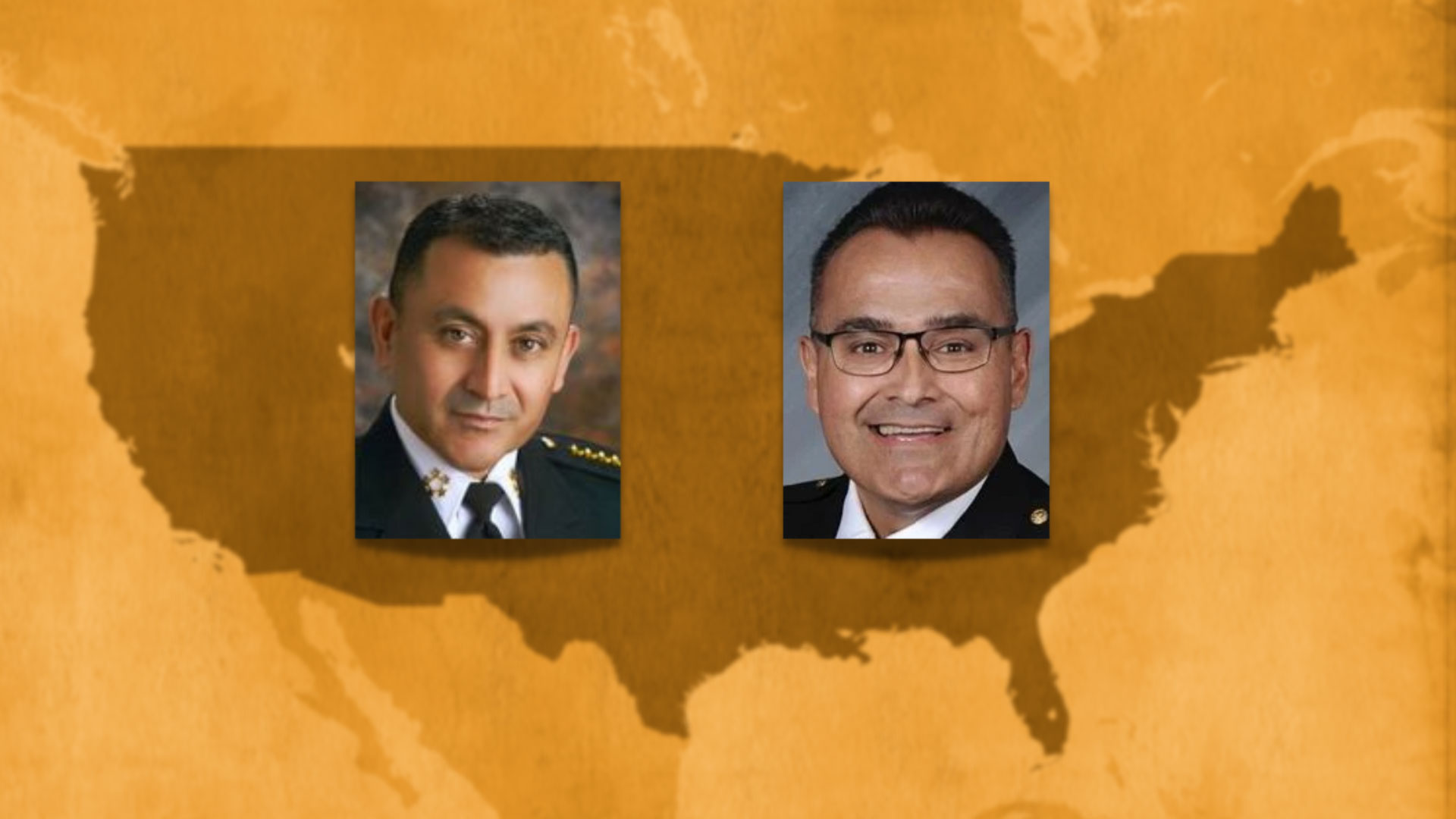Machine Gun Manny
There’s no down-the-middle, dispassionate way to characterize the story that appeared Oct. 26 on the Albuquerque Journal’s front page under the headline, “Former BernCo sheriff, undersheriff named in cross-country machine gun scheme”. It is, to borrow a term repopularized in the 1960s by beloved New Journalist Tom Wolfe, bananas.
My initial reaction to the words in big type was: “Wait…what?” As I read the reporting from the Journal’s Matt Reisen, who has my old job as criminal justice reporter for the paper, my phone began to melt. Sources and friends were texting, calling, emailing in the way they have for two-plus decades when news like this breaks: rapidly and in a torrent. “Is this real life?” read a typical message.
I encourage you to read Matt’s initial reporting and his follow-up story from a few days later for the details and the context. And if the proverbial rabbit hole is more your style, read this indictment, filed July 27 in U.S District Court in Maryland and unsealed late last month.
Here are the broad strokes, as alleged in the indictment: A then-federal Department of Homeland Security analyst named Sean Sullivan sat atop a web of other folks, many of whom also worked in law enforcement or the military in various capacities, who were defrauding the Bureau of Alcohol, Tobacco, Firearms and Explosives to import, sell and, in some cases keep for themselves fully automatic weapons that would have otherwise been illegal had it not been for a complex scheme.
Sullivan, so allegeth the indictment, was tight with a Special Forces operator turned high-level firearms instructor and YouTube gun enthusiast celebrity named Larry Vickers. According to the indictment, Vickers knew police chiefs and gun dealers around the country. He used those connections, the feds say, to obtain “law letters,” documents signed by law enforcement officials certifying that the otherwise-restricted MP5s, Uzi pistols, automatic Glock handguns and other weapons of both war and violent street crime would be used for the legal purposes of demonstrations and, potentially, purchase by police and sheriff’s departments. Sullivan, in turn, used the law letters to import what the U.S. Justice Department succinctly calls “machine guns.”
Among the gun dealers Vickers worked with, the indictment states, was Albuquerque-based James Christopher Tafoya. And where, according to federal authorities, did Tafoya obtain law letters to further the alleged conspiracy? Over a five-year period, then-Bernalillo County Sheriff Manny Gonzales signed 127 such documents, requesting 598 machine guns for demonstration. And during a yearlong stretch from 2020-2021, then-Laguna Pueblo Police Department Chief Rudy Mora, who previously had been Gonzales’ undersheriff at BCSO, submitted 17 law letters to Tafoya, requesting 414 guns for demonstrations.
“At the time they signed the law letters… [Gonzales] and [Mora] had no expectation or understanding that such weapons would ever be demonstrated to their respective law enforcement agencies,” the indictment reads.
Neither Gonzales nor Mora has been charged with a crime. But two other lawmen have: Matthew Hall, former police chief in Coats, North Carolina; and James Sawyer, who leads the tiny Ray Police Department in North Dakota. Based on a careful reading of the indictment, those two guys engaged in conduct nearly identical to that of Mora and Gonzales.
Wait…what?
We had a ton of questions about this story at NMPBS, and we knew we’d want to dive into it for an episode of New Mexico in Focus. What happened to all those guns, particularly in a city like Albuquerque, where the number of residents killed and wounded by bullets has spiked in recent years? Will either Gonzales or Mora be charged?
I’m grateful to Matt Reisen for making his first appearance on the show this week to help us break it all down. Matt doesn’t know the answers to either of those questions — I can assure you that he’s asking them, though, and that you’ll read them in the Journal once he does — but he did a masterful job of explaining the machine gun scheme and some of the context surrounding it. I particularly enjoyed the way Matt expanded on an analogy he used in his first story to help readers understand the scheme. Think of it, he wrote, like a doctor writing fraudulent prescriptions to help his friends obtain drugs. In this case, Gonzales, Mora, Sawyer and Hall were the doctors; Sullivan, Tafoya and Vickers were the friends.
The drugs? A Colt M16 A2 Commando, a few IMI Uzis, a bunch of Swiss Arms SG553s and a laundry list of other highly efficient killing machines, silencers and other restricted gadgets.
Of note: There is one hint in the public record so far as to whether we’ve seen the end of this federal case. When Matt asked Jayme Fuller, the spokeswoman for current Bernalillo County Sheriff John Allen, to comment, Fuller replied: “Due to the ongoing investigation, Sheriff Allen will not be providing interviews related to the indictment at this time.”
You can watch my conversation with Matt on YouTube.
We wanted to explore another question about all this, perhaps a deeper one: How, in Gonzales’ case, was the top elected law enforcement official in New Mexico’s most populous county able to sign these allegedly bogus law letters for five years without anyone catching on? To get at that, I enlisted Dianne Layden to sit for an interview. Dianne and I have been talking about policing and police accountability since the early 2000s. And she’s been watching the criminal justice system and other matters of public concern a lot longer than that. She was a deputy Bernalillo County manager in the 1970s and has served on countless boards and commissions since then.
A theme emerged as Dianne and I spoke, and it grew from the word “elected.” As they are around the country, sheriffs in Bernalillo County are chosen by voters. That’s different from how the City of Albuquerque, for example, chooses a top cop: The mayor appoints the police chief, and the mayor can fire the police chief. That means, ostensibly, anyway, oversight and accountability mechanisms are baked into the pie. With sheriff’s, however, neither the County Commission nor the county manager have much authority, other than control of the budget. As such, checks and balances are essentially nonexistent. County leaders have expressed frustration to Dianne – and to me – for years about this systemic inability to install guardrails when a sheriff goes rogue.
Plenty of people who live here feel like that’s what happened with Gonzales, and many of them felt that way long before this machine gun story broke. His time in office was checkered, to put it kindly, with a stubborn resistance to equipping his deputies with body cameras, his association with the right-wing so-called “constitutional sheriffs movement” and several unconstitutional shootings that led to high-dollar settlements during his tenure comprising some of the lowlights. You can watch our full conversation where Dianne and I touched on some of that.
Gonzales’ time in office also led to something else.
James Collie spent one year on the County Commission, completing the term of Maggie Hart Stebbins, who left for a job in state government. Collie wanted to get something done during his 12 months. Gonzales inspired him to create the Sheriff’s Office Advisory and Review Board, on which Dianne Layden now sits. The board’s name was carefully chosen and intentionally does not include the word “oversight.” That’s because there’s no mechanism for that kind of watchdog over sheriffs in state law.
I wrote a couple of weeks ago about the chaotic and ineffectual nature of citizen police oversight for the Albuquerque Police Department. In that essay, I also noted the importance of allowing the people who live here to have a say in the way they’re policed.
Dianne tells me that Gonzales never came to board meetings – a sign that he wasn’t interested in his department being either advised or reviewed. Sheriff Allen, on the other hand, seems more engaged and open to feedback from residents, Dianne reports.
Perhaps the machine gun scheme, however it turns out for Gonzales and Mora, will push the Legislature to consider whether state law, the New Mexico Constitution and oversight for sheriffs might need another look.
-Jeff Proctor, Executive Producer
-
Transit Equity in Albuquerque
11.17.23 – Earlier this month, city councilors voted 6-3 to keep bus fares free in Albuquerque. That’s after a report from…
-
Albuquerque City Council Targets Air Quality Rulemaking
11.17.23 – Our Land’s Laura Paskus sat down with the New Mexico Environmental Law Center’s Eric Jantz to understand how two…
-
Exploring Oversight: NM Lawmen Mentioned in Machine Gun Scheme Indictment
11.17.23 – Executive Producer Jeff speaks with Dianne Layden, a member of the Bernalillo County Sheriff’s Office Advisory Review Board, to…
-
NM Lawmen Mentioned in Machine Gun Scheme Indictment
11.17.23 – This week on New Mexico in Focus, Executive Producer Jeff Proctor speaks with Matthew Reisen from the Albuquerque Journal…





